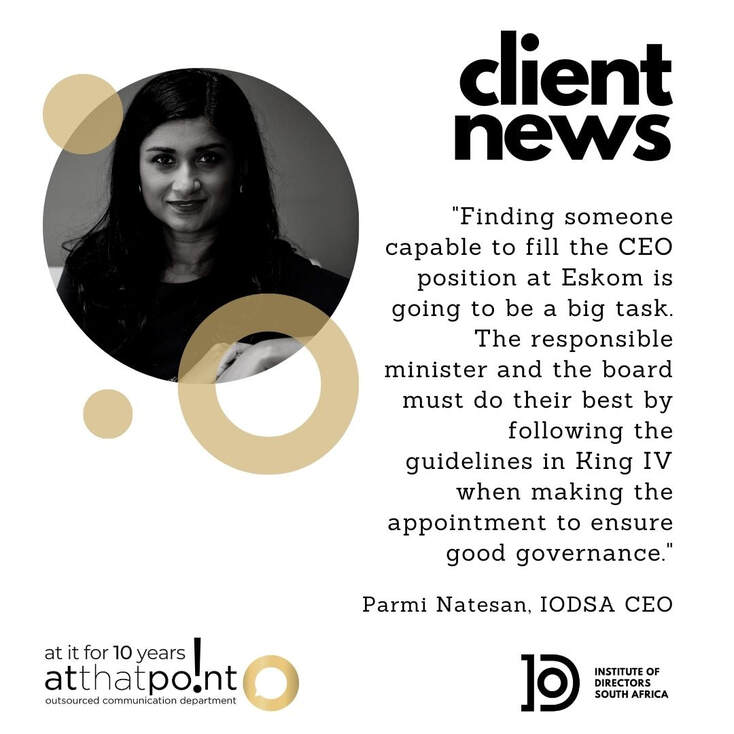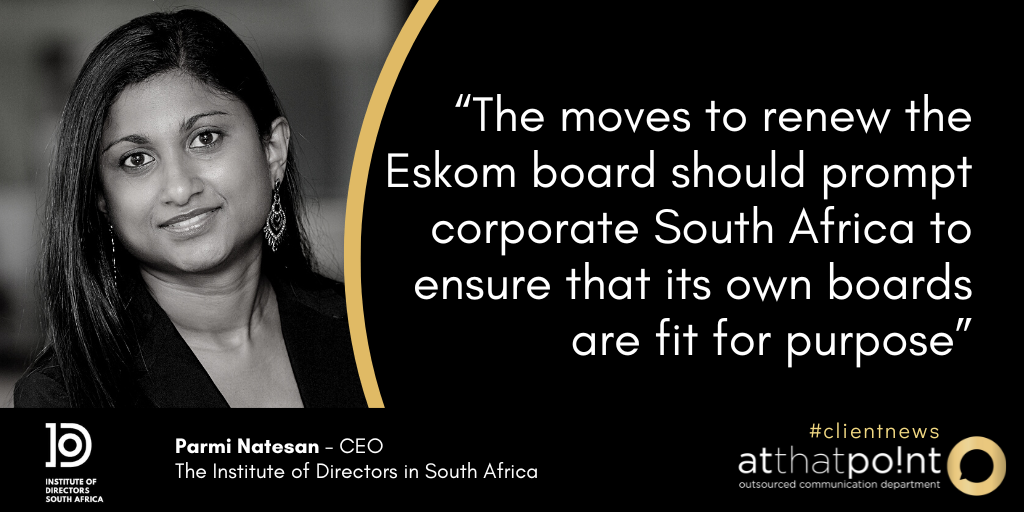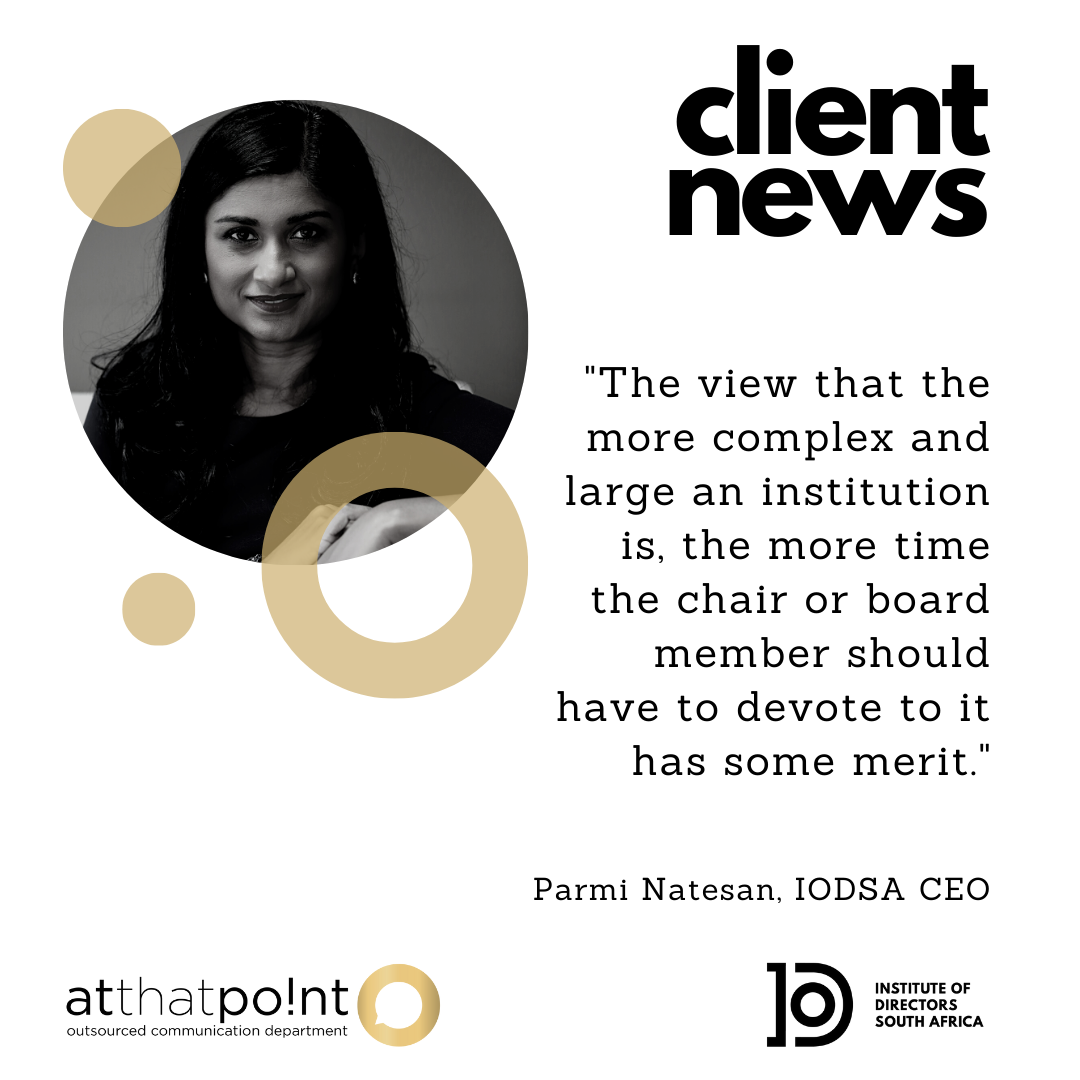|
A recent editorial in Business Day raised a perennial governance hot potato: just how many boards should a single individual be able to serve on? The tenor of the article was that the current chair of Capitec should focus on that role, and risked being distracted by chairing two other boards as well.
“The view that the more complex and large an institution is, the more time the chair or board member should have to devote to it has some merit,” says Parmi Natesan, CEO, the Institute of Directors in South Africa. “For example, the decision by the current chair of Eskom to resign as chair of a large bank to concentrate on leading the power utility’s board was probably a wise move. “However, because organisations are of varying sizes and degrees of complexity, and individuals have different capacities, the IoDSA does not believe it makes sense to attempt to create a hard-and-fast rule about how many boards an individual should be able to chair or, indeed, sit on.” She argues that it remains up to each organisation to determine how much time each board member’s role requires, and to ensure that current or prospective board members can commit to that. The individual director’s ability, experience and capacity would also be factors to consider. In addition, board chairs and directors (especially those serving on key board committees) need to have the flexibility to ramp up the time they devote to their work during periods of crisis. Individuals who are fully committed will not have that flexibility. In view of the growing realisation that governance plays a crucial role in ensuring corporate sustainability, investors are starting to take note of how many boards non-executive directors serve on. In the United Kingdom and United States, institutional investors (often via proxy services) oppose the appointment of directors with more than five board seats. In India, by contrast, the legal limit of directorships is 20. King IV addresses the problem by recommending transparency, advising independent non-executive directors to detail their other board commitments and to provide a written undertaking that they have enough time to discharge their board responsibilities (Principle 7, Recommended Practice 18). “Given the importance of the director’s role, it might make sense for boards to formalise the minimum amount of time that each role requires. The overriding principle is that the issue needs to be thoroughly ventilated and minuted to ensure there is consensus about what the role demands, and whether each director can give the time needed,” she concludes. “The Nominations Committee also plays a key role in monitoring the attendance and involvement of board members, and should act swiftly where there are capacity concerns.” ENDS MEDIA CONTACT: Stephné du Toit, [email protected], 084 587 9933, www.atthatpoint.co.za For more information on the IoDSA please visit: Website: www.iodsa.co.za Twitter: @The_IoDSA LinkedIn: Institute of Directors South Africa Company Page Facebook: Institute of Directors South Africa
0 Comments
 The current crisis at Eskom has a number of governance lessons for South Africa, one of which is the vital importance of proper succession planning for key senior positions, says Parmi Natesan, CEO of the Institute of Directors in South Africa (IoDSA). “The imminent departure of both the CEO and COO of Eskom in the next few months, with no obvious successors being communicated, raises concerns,” she says. “Now is really not the time for the two top positions—and many other senior management ones—to be vacant. In fact, Ms Natesan continues, the Eskom Statement on 14 December 2022 makes it clear that Mr De Ruyter’s agreement to stay on beyond the required 30-day notice period is welcome because there seems to be no planned successor for his position. The statement quotes the board chair as follows: “Mr De Ruyter has agreed to stay for an additional period beyond the stipulated 30-days’ notice to ensure continuity while we urgently embark on a search for his successor”. It remains to be seen whether there are plans in place for a succession to the COO, Jan Oberholzer, who is due to retire in April—a month after Mr De Ruyter leaves—and it is also unclear as to whether he will remain available to hand-over to a successor when one is appointed. King IV specifically states that the board should satisfy itself that there is succession planning for the CEO and other executive positions in place to provide continuity of executive leadership. Succession planning should be reviewed periodically and should provide for both succession in emergency situations and succession over the longer term. This should include the identification, mentorship and development of future candidates. The IoDSA has repeatedly said that the way the CEOs of key state-owned enterprises have been appointed were not in line with good governance as outlined in King IV. Too often, the powerful single shareholder bypasses the board in making the appointment. This leads to problems because the CEO is seen as a representative of the shareholder, and thus sometimes does not feel accountable to the board. Skewed reporting lines set the board and executive management up for conflict, with bad results for the organisation. “Finding someone capable to fill the CEO position at Eskom is going to be a big task. The responsible minister and the board must do their best by following the guidelines in King IV when making the appointment to ensure good governance,” she concludes. “Good governance is the foundation of good organisational performance—and the converse is also true.” ENDS MEDIA CONTACT: Stephné du Toit, [email protected], 084 587 9933, www.atthatpoint.co.za For more information on the IoDSA please visit: Website: www.iodsa.co.za Twitter: @The_IoDSA LinkedIn: Institute of Directors South Africa Company Page Facebook: Institute of Directors South Africa  The Minister of Public Enterprises, Pravin Gordhan, has made headlines by announcing that the board of Eskom would be reconstituted and renewed. According to Parmi Natesan, CEO, Institute of Directors in South Africa (IoDSA), the moves to renew that Eskom board should prompt corporate South Africa to ensure that its own boards are fit for purpose, and have the right combination of skills, knowledge and experience to add value to the company. The first step is to assess urgently exactly what skills are needed. Business/financial skills are clearly important, but so are specialist, industry-specific skills—like engineering/energy in the case of Eskom. “Some have commented with disappointment that the country’s sole energy utility had virtually nobody on its board who has domain expertise in its core business,” she says. “This is a basic shortfall that every company should guard against when assessing their board skills matrix.” Boards also need individuals who are skilled in developing and monitoring strategy, and who understand how to monitor effective governance frameworks. More generally, she points out, directors also need to possess skills relating to directorship itself. The IoDSA has long advocated the professionalisation of directorship in response to the increasing importance of the board’s role, and the fact that directors can be held liable in law for their actions. Its Directory Competency Framework provides a guide to the professional skills a director should acquire, and its two professional designations—Certified Director and Chartered Director (South Africa)—provide a structured programme for attaining them, and ensuring they are kept up to date. A particular challenge for public-sector boards is that directors are often replaced as a whole collective unit, leading to a calamitous loss of institutional knowledge and inevitably creating a leadership vacuum until the new board can get up to speed. A programme of staggered rotation, such as is generally followed in the private sector, makes much more sense from multiple points of view. Ideally, the Minister would follow the wise advice of King IV and exercise his power of appointing board members in line with the boards, and ultimately the company’s needs, and not purely in terms of political affiliation. “Boards (and those appointing them, in this case Ministers) should regularly evaluate what skills are needed and whether the Board as a collective in fact possesses them, and then take steps to close any gaps,” Ms Natesan comments. The IoDSA strongly urges boards and shareholders to use this opportunity to take a long, hard look at their board composition, and then take any necessary remedial steps if necessary to make improvements.” ENDS MEDIA CONTACT: Stephné du Toit, [email protected], 084 587 9933, www.atthatpoint.co.za For more information on the IoDSA please visit: Website: www.iodsa.co.za Twitter: @The_IoDSA LinkedIn: Institute of Directors in South Africa Company Page Facebook: Institute of Directors South Africa |
Archives
July 2024
Categories
All
|


 RSS Feed
RSS Feed